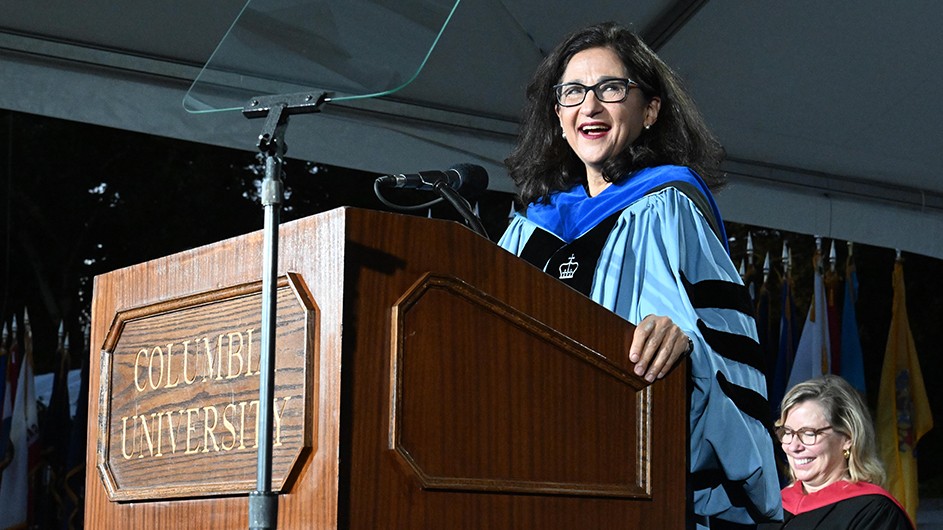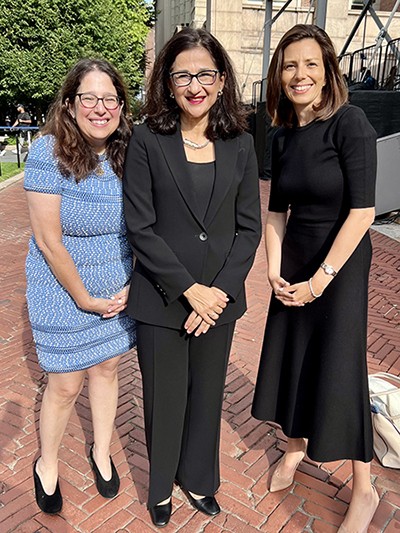President Shafik Welcomes New Undergraduates to Columbia
In remarks to incoming students and their families, President Shafik shared personal memories, offered advice, and reflected on the University’s increasing engagement with global challenges.

At the start of New Student Orientation Week, Columbia President Minouche Shafik spoke at ceremonies welcoming students to Columbia College, Columbia Engineering, and Columbia General Studies.
Shafik, who began her tenure as the University’s 20th president on July 1, 2023, reflected on the excitement and the anxiety that surround new beginnings. She identified with the undergraduates starting their Columbia journeys and shared in the pride of their families.
She told the new students to be ready for new experiences and challenges: “Take advantage of the breadth of opportunities offered here. Invest in friendships, build relationships with your professors, and delve deep into the world of ideas.”
She also advised them to think expansively about the kinds of experiences they wanted to have and about what they were going to do with their Columbia educations after graduation: “How will you bring your skills and your knowledge to bear on the major problems facing our global society?”
“You are about to experience a lot of firsts”
In her remarks, President Shafik encouraged the incoming students to embrace the growth that comes with new experiences.
“You are about to experience a lot of firsts. For me, as a girl who grew up in southern climates, college was the first time I saw snow. And it took me a long time to accept the necessity of a down jacket and proper boots. I had one roommate who introduced me to Joni Mitchell, and another who didn’t believe in owning a lot of clothes and strung a line for doing her daily laundry across our room.
It’s mind opening, meeting people who are different from you, who think differently from the way you do, who have different backgrounds and views. You should expect to be challenged to engage with new perspectives, to debate ideas with which you disagree, and to be willing to revise your beliefs in the face of new evidence.”
She counseled that these experiences are often difficult, but that is as it should be.
“At times, this may feel awkward or uncomfortable. It might feel difficult. That is as it should be. That is what it feels like to be part of a culture that values intellectual inquiry and the free exchange of ideas. That is what it feels like to be at the frontier. It is how humanity has made progress over millennia.”
“The Core, a singular undergraduate experience”
President Shafik spoke about the powerful legacy of the Core Curriculum, “a singular undergraduate experience that connects students across Columbia College, Columbia Engineering, and Columbia General Studies.”

The courses of the Core introduce students to influential books and ideas in literature, philosophy, science, history, art, and music. They engage with the works of the Western canon and with the cultures of Africa, the Americas, Asia, and the Middle East.
“They will demand that you think critically, consider new perspectives, and wrestle with profound questions about the human experience that have bedeviled the brightest minds throughout history. Importantly, you will engage with this material together. In so doing, you will prepare for life as an engaged global citizen, someone who acquires knowledge and debates with others to inform the role you want to play in today’s ever-evolving world.”
“You are here to experience an extraordinary intellectual awakening, to stand on the shoulders of giants, to learn from their mistakes, and to make your own contributions.”
The “mission of the university”
In her address, President Shafik reflected on the long history of universities and institutions of higher education, which have existed for millennia.
“There is something special, even magical, about the tradition of students and scholars coming together to create these unique environments of learning.”
She remarked that “The challenge for universities has always been to stay rooted in these traditions while adapting and reinventing to fit the demands of new eras.”
“It used to be that the primary mission of the university was to educate young people and create new knowledge, in the form of scholarship and research. The work was done when the student graduated, or when the professor’s research got published.
Today, the critical questions we ask include, ‘What are you going to do with the training you’ve acquired?’ and ‘How are you going to use the research you’ve conducted for the betterment of society?’ Look behind me at the inscription on Low Library which says we want to be an institution that is ‘cherished by generation after generation for the advancement of the public good.’”
“I am better because I am at Columbia”
President Shafik shared a selection of quotes she had collected while meeting with students, faculty, and staff during her first months in office.
Her favorites included:
“I am better because I am at Columbia.”
“If you can imagine it, there's a high probability you can make it happen at Columbia.”
“What I love about Columbia is its independent spirit. Its lack of snobbery—It's warm. It's scrappy. It's New York City.”
“Columbia is located in the richest city in the world, in every sense.”
“We chose to come to Columbia University in the City of New York”
In closing, President Shafik reflected on Columbia’s location in one of the most dynamic, diverse, and global cities in the world.
“When we chose to come to this institution, we chose to come to Columbia University in the City of New York. Like our campuses, New York is much more than a collection of buildings. It’s a rich and diverse community of people—the most extraordinary collection of people you will find anywhere.
We are all New Yorkers now.”